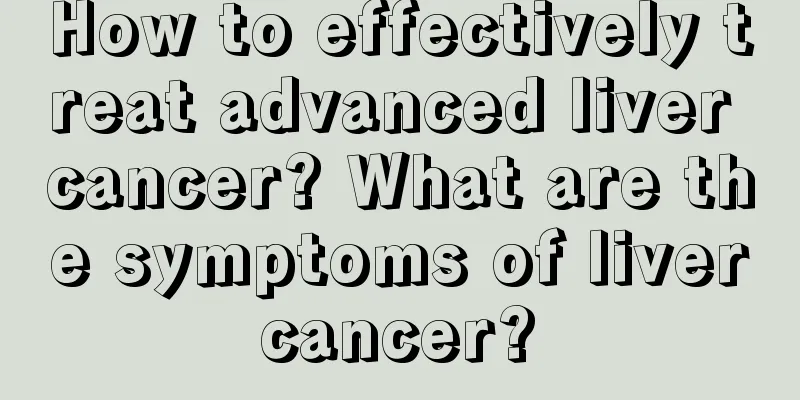How to effectively treat advanced liver cancer? What are the symptoms of liver cancer?

|
The liver is a very important organ in our body, and its function is very strong. Therefore, once there is a problem with our liver, it means that there is a big problem with our body. However, people generally do not want their condition to develop into liver cancer. So how do we determine if we have liver cancer in life? What are the symptoms of liver cancer? 1. Digestive tract symptoms Loss of appetite, upper abdominal fullness after meals, flatulence, indigestion, nausea, and diarrhea are common digestive tract symptoms of liver cancer. 2. Lower limb edema in the middle and late stages of liver cancer Patients with liver cancer and ascites often have lower limb edema, which may occur at the ankles in mild cases and spread to the entire lower limbs in severe cases. The main reason is that ascites compresses the lower limb veins or tumor thrombus blocks venous return. Mild edema can also be caused by low plasma albumin. 3. Bleeding tendency in late stage liver cancer Liver cancer patients often have bleeding gums, subcutaneous ecchymoses and other bleeding tendencies. Gastrointestinal bleeding is also common, mainly due to portal hypertension leading to esophageal varices. In fact, gastrointestinal bleeding is also one of the main causes of death in patients with advanced liver cancer. 4. Acute abdomen Rupture of cancerous nodules usually causes pain in the liver area. During physical examination, there is obvious tenderness in the liver area, which is a symptom of liver capsule irritation. After the rupture of cancerous nodules, some patients experience acute abdominal pain accompanied by peritoneal irritation symptoms, which can be easily misdiagnosed as acute peritonitis. Abdominal pain caused by rupture of cancerous nodules is usually accompanied by a drop in blood pressure or even shock, which is different from general acute peritonitis. 5. Acute abdominal pain symptoms After the cancerous nodules rupture, some patients experience acute abdominal pain accompanied by peritoneal irritation symptoms, which can be easily misdiagnosed as acute peritonitis. The abdominal pain caused by the rupture of cancerous nodules is usually accompanied by a drop in blood pressure or even shock. This is a relatively obvious hazard of liver cancer to the human body. How to treat advanced liver cancer 1. Surgery The traditional treatment for liver cancer is surgical resection, but not all liver cancer patients are suitable for surgery. Only patients with good cardiopulmonary function, localized liver tumors, and no metastasis are suitable for surgery. The tumor tissue is completely removed through surgery to achieve the purpose of cure. These mainly include liver resection and liver transplantation. 2. Chemotherapy Chemotherapy is the main treatment for advanced liver cancer. It has a relatively direct inhibitory effect on cancer, but it also kills normal cells while killing cancer cells. The most obvious reactions are impaired digestive function and suppressed bone marrow hematopoietic function. 3. Ultrasound ablation therapy Most patients with advanced liver cancer or metastatic liver cancer combined with tumor lesions in other parts of the body no longer have the opportunity for surgery, but they still need to treat local tumors to prolong life and relieve symptoms. Tumor ablation can be considered at this time. 4. Traditional Chinese Medicine Treatment Traditional Chinese medicine has a long history in China, and it is also very effective in treating cancer. If liver cancer is treated with traditional Chinese medicine, the effect is often complementary, which can alleviate the patient's pain as much as possible, and reduce the various toxic side effects of Western medicine alone. 5. Interventional treatment It is also a commonly used method, so what are the limitations of this method? Liver cancer mainly relies on the hepatic artery for blood supply, but there is portal vein blood supply around the cancer mass, so cancer cells can "survive in vain". Even if the operation is carried out superselectively, due to reasons such as high-pressure injection, it may cause accidental thrombosis, shunting and inevitable micro-metastasis; some patients' blood vessels are blocked after one treatment, making it difficult to operate again. |
<<: What are the preventive measures for lung cancer? Several effective ways to prevent lung cancer
Recommend
How long can you live with melanoma, if the treatment is so effective
There is no clear answer as to how long a person ...
What are the symptoms of advanced liver cancer? Introduction to the symptoms of advanced liver cancer
Cancer is a very serious phenomenon. Liver cancer...
What are the causes of oral and tongue ulcers? Causes of oral and tongue ulcers
Modern people have a heavier taste, especially th...
How to get over social phobia
The family environment and personality factors of...
Treatment options for esophageal cancer
Treatment options for esophageal cancer include: ...
What is the normal gallbladder wall thickness
The thickness of the gallbladder wall is closely ...
What tests should I do for heart pain?
The heart is one of the most powerful organs in t...
Pancreatic cancer is a lifestyle cancer
Steve Jobs, one of the founders of Apple and form...
Nasal folds drooping
The time when nasolabial folds appear is differen...
Principles of drug treatment for endometrial cancer
The treatment principles for endometrial cancer s...
What are removable dentures like?
In our daily life, everyone has their own eating ...
Red cheeks in summer
The weather in summer is very hot. The summer sun...
What are the specific disadvantages of skipping breakfast
Three meals a day is a normal way of eating for u...
People need to pay attention to the common causes of lung cancer
Lung cancer is now a common tumor disease that ha...
What causes belly button bleeding and how to treat it
If there is bleeding in the belly button, it is u...









